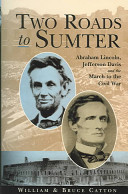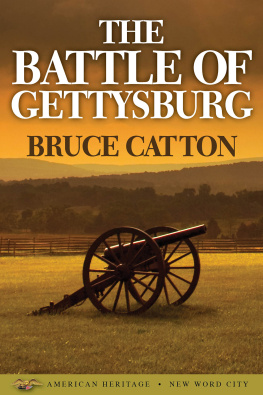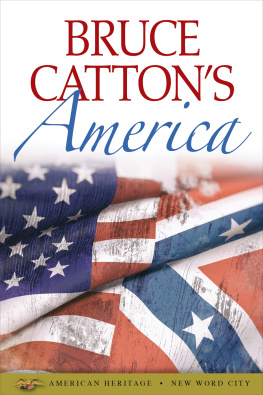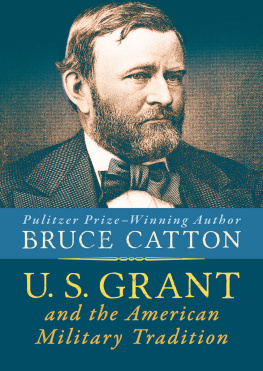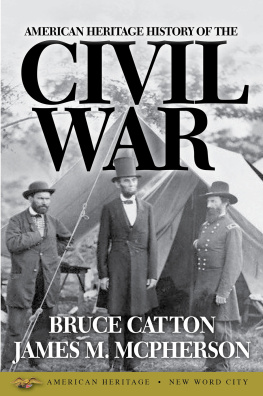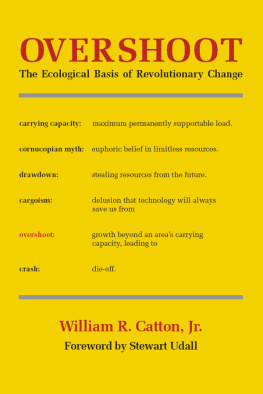William Bruce Catton - Two roads to Sumter
Here you can read online William Bruce Catton - Two roads to Sumter full text of the book (entire story) in english for free. Download pdf and epub, get meaning, cover and reviews about this ebook. year: 1963, publisher: New York, McGraw-Hill, genre: Politics. Description of the work, (preface) as well as reviews are available. Best literature library LitArk.com created for fans of good reading and offers a wide selection of genres:
Romance novel
Science fiction
Adventure
Detective
Science
History
Home and family
Prose
Art
Politics
Computer
Non-fiction
Religion
Business
Children
Humor
Choose a favorite category and find really read worthwhile books. Enjoy immersion in the world of imagination, feel the emotions of the characters or learn something new for yourself, make an fascinating discovery.
- Book:Two roads to Sumter
- Author:
- Publisher:New York, McGraw-Hill
- Genre:
- Year:1963
- Rating:3 / 5
- Favourites:Add to favourites
- Your mark:
- 60
- 1
- 2
- 3
- 4
- 5
Two roads to Sumter: summary, description and annotation
We offer to read an annotation, description, summary or preface (depends on what the author of the book "Two roads to Sumter" wrote himself). If you haven't found the necessary information about the book — write in the comments, we will try to find it.
Two roads to Sumter — read online for free the complete book (whole text) full work
Below is the text of the book, divided by pages. System saving the place of the last page read, allows you to conveniently read the book "Two roads to Sumter" online for free, without having to search again every time where you left off. Put a bookmark, and you can go to the page where you finished reading at any time.
Font size:
Interval:
Bookmark:
TWO ROADS
SUMTER
$5.95
Using the GQrly lives and careers of A bra-ham Lincoln and Jefferson Davis as theme and framework, two brilliant historians tell the tragic story of the march by North and South along the
TWO ROADS TO SUMTER WILLIAM & BRUCE CATTON
Two Roads to Sumter is the result of the first collaboration between the famed his torian Bruce Catton and his son William. Their book is focused on America in the 1850s, and as the title implies, it is a study of the North and South as they began their long, heartbreaking march to Civil War.
In contrast to this larger view, the book also examines the formation and diver gence of Abraham Lincoln's and Jefferson Davis's attitudes during the most emotion-laden and complex period of American history.
The Cattons begin their story in Ken tucky, not only because so much of the conflict was visible there, but also because it was the birthplace of both Lincoln and Davis. As the book continues, the reader is given, in parallel form, the growth and development of both men, showing the similarities and differences in the moral and intellectual forces that shaped two figures who were to become the war (continued on back flap)
JACKET DESIGN BY RUPERT FINEGOLD
973-711
Catton
Two roads to Sunrter
63-09665

TWO ROADS
T Q-,S ; H
* f ,. :
BOOKS BY BRUCE CATTON
America Goes to War
Army of the Potomac (3 vols.} i. Mr. Lincoln 9 s Army
2. Glory Road 3. A Stillness at Appomattox
Centennial History of the Civil War
i. The Coming Fury 2. Terrible Swift Sword
Grant Moves South Michigan's Past and the Nation's Future
This Hallowed Ground
U.S. Grant and the American Military Tradition The War Lords of Washington
WITH PRANK ARETAS HASKELL
Battle of Gettysburg
WITH WILLIAM CATTON
Two Roads to Sumter
EDITED BY BRUCE CATTON
American Heritage Book of Great Historic Places
American Heritage Book of the Revolution
American Heritage Picture History of the Civil War
First Year of American Heritage
TWO ROADS
TO SUMTER
by William and Bruce Catton
McGraw-Hill Book Company, Inc.
NEW YORK TORONTO LONDON
TWO ROADS TO SUMTER
Copyright 1963 by William and Bruce Catton
Printed in the United States of America. All Rights Reserved, This book or parts thereof may not be reproduced in any form without written permission of the publishers.
Library of Congress Catalog Card Number: 63-13930 10254
To David Bruce
[CONTENTS]
Introduction /
ONE Like a Crouching Lion 5
TWO The Shaping Years 24
THREE Sunlight & Shadow 57
FOUR Moderation Challenged, 1846-1854 80
FIVE Moderation in Retreat, 1854-1858 112
six Moderation in Eclipse, 1858-1860 152
SEVEN The Campaign of 1860 IQ&
EIGHT And the War Came 243
INTRODUCTION
The two cabins were less than one hundred miles apart, in what was then the half-settled wilderness of west-central Kentucky. There are monuments on both sites now, and historical markers, and museum-piece restorations of the frontier setting in which the two boys were born. The region still carries its indefinable air of his tory once in the making, and thoughtful tourists who make the pilgrimage to either spot will find much to contemplate. An ironic coincidence, surelynothing morethat the two men who opposed each other as chief executives of a divided nation in 1861 should have their origins less than a year apart in the backwoods of Ken tucky. Yet in the lives of Jefferson Davis and Abraham Lincoln, as in the fateful controversy that led their country into war, much that gave meaning was present in the rugged land from which they sprung.
The American Civil War is far too big to be explained solely in the lives of two men. The size of the struggle was greater than the size of any of the participantsexcept possibly for the hun dreds of thousands of nameless Americans of both sections who carried most of the load and paid the ultimate price. Yet when one tries to see just how this war came about, why the people on both sides fought so hard and what the whole of it finally means,
one does come back to the two protagonists, the two American presidents who faced one another in the most terrible war America has fought.
They were of their respective peoples, and they spoke for them; they were wholly representative, in their hopes, their achieve ments and their failures; and they came from the same place. They were two Kentuckians who at last came to speak for (and to demand much of) the two sections which began as one and which came to be so tragically hostile and in the.blood and smoke of unlimited war laid the foundation for a new unity and a new definition of the meaning of American freedom.
Abraham Lincoln and Jefferson Davis did not bring the war about. They were, as the word went then, moderates, sharing a common vision of the ultimate value of an undivided country, hoping that the country could compose its differences without loss of blood. But the war came, partly in spite of these men and partly because of them, and when it came they fought one an other, and led others to fight, so tenaciously that the nation had its most fearful trial by combat. Lincoln and Davis were both the leaders of their peoples and the victims of their times. Most men in the North and most men in the South unquestionably wanted to find some peaceful solution to the controversy that was splitting the country; beyond any doubt these two leaders wanted the same thing. The tragedy was that in the end the moderate way collapsed. The nation had stumbled into a situation where it was no longer possible to be moderate.
So the country tried to work out a solution by violence. The solution it finally got was imperfect and is today incomplete, and we still have problems. As we grapple with these problems we are driven to go back and try to see how the whole thing happened to explore the terrible drift toward war, to try to understand why Americans a little more than a century ago defined freedom in ways so different that they had to fight. One thing we can see clearly; at least the business came from the heart. Somehow, in the very center of America, radically diverse understandings of the meaning of the American experiment took shape. These di verse understandings were built-in; they came out of what Amer
INTRODUCTION
leans were and hoped for; and when the showdown came no one quite knew how to reconcile them and work out a synthesis.
So these two moderate men, Abraham Lincoln and Jefferson Davis, became leaders in a war which was fought altogether with out moderation. Perhaps one way to gain a comprehension of what happened then is to trace the parallel careers of these two men whose origins were so close and whose backgrounds were so similar. What follows here is an attempt to show how and why their paths went so far apart and at last met so tragically; an effort to see where and how their stars became so crossed.
Two Kentuckians: one went this way, the other went that way, and of the men who followed them 600,000 lost their lives. This book tries to examine what those separate ways were, why they were taken, and what they led toward.
[ONE]
LIKE A CROUCHING LION
Always America looked westward. The nation was built on hope, ambition, and a contradictory bundle of dreams, and the pattern seldom varied. Whether they came to worship God in a fresh atmosphere, or to find security and fortune from a continental supply of cheap land, or merely, as one sardonic New Englander put it, to catch fish, the men who first crossed the ocean and the men who followed or went beyond them in later years had their eyes on a spot real or imagined, but always somewhere over the western horizon. First it was the fringe of settlements along the Atlantic coast. Then it was the uncharted back country a few miles inland. By the middle of the eighteenth century the restless vanguard which always drew the nation westward in its wake was crossing the wooded Appalachians into the vast, rich basin of the Mississippi. Once this region took shape in men's imagina tion as the new American West, the country's future was assured. For several generationsfrom the expulsion of Bourbon France as a New World power till the age of Andrew Jacksonthe core of this new West was Kentucky. Kentucky in its heyday was both symbol and target of national growth, a vital focus and crossroad of American empire. Strung out along the south bank of the Ohio from the western Appalachians to the Mississippi, its dense forests
Next pageFont size:
Interval:
Bookmark:
Similar books «Two roads to Sumter»
Look at similar books to Two roads to Sumter. We have selected literature similar in name and meaning in the hope of providing readers with more options to find new, interesting, not yet read works.
Discussion, reviews of the book Two roads to Sumter and just readers' own opinions. Leave your comments, write what you think about the work, its meaning or the main characters. Specify what exactly you liked and what you didn't like, and why you think so.

